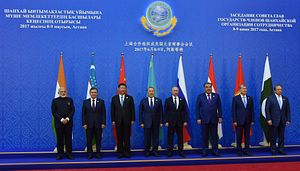With India’s recent ascension to the Shanghai Cooperation Organization (SCO), a Eurasian political, economic, and security organization, analysts are forecasting the impact of New Delhi’s reinvigorated engagement with Eurasian geopolitics.
The predictions are numerous, as one might expect for a non-Western organization dominated by China and Russia — ranging from the SCO as a means for India-Pakistan reconciliation, to new complications for the China-Russia rivalry, and even the emergence of new trilateral alliances.
What this commentary ignores is a fifth state: the increasingly important Kazakhstan, one of four Central Asian nations that comprise the organization’s membership. Ultimately, enhanced engagement between India and Kazakhstan, realized through economic and security initiatives that build off the SCO, would improve the geopolitical situations of both nations while diminishing the overbearing influence of China and Russia
At its core, the heightened India-Kazakhstan relationship allows New Delhi to bypass Pakistan and the highly unstable Afghanistan to reach a resource-rich Astana, complementing India’s developing economy. Though India must pursue this strategy outside the SCO, the organization will inevitably stimulate lucrative deals with India, which Prime Minister Narendra Modi can use to negotiate with Kazakhstan.
Given their shared borders with terror-prone nations, India should use its growing economic influence in Central Asia to cajole Kazakhstan to also denounce Pakistan’s support for terrorist organizations. Kazakhstan would be naturally inclined to partner with India on such matters due to the concern both nations have with religious extremism and terrorism. India’s efforts would garner political capital and goodwill in Kazakhstan, as well as the rest of Central Asia, for its proactive actions on the “three evils”: terrorism, extremism, and separatism.
Kazakhstan can also help India achieve a geostrategic rebalancing with China. India’s foremost objective is countering the rapid economic inroads China is making in the region through the One Belt One Road (OBOR) initiative, while still avoiding hostilities with Pakistan. Modi seeks to achieve this with the competing North-South Transport Corridor (NSTC). While Kazakhstan has benefited immensely from the economically rewarding OBOR initiative, it also has legitimate fears about overreaching Chinese influence.
By shoring up bilateral confidence and marketing itself as a more respectful alternative to China, India could work to secure greater support from Kazakhstan. In turn, New Delhi would balance or potentially even weaken the support for China’s OBOR while deepening its economic links across Central Asia.
The potential for expanded military cooperation between Kazakhstan and India is yet another benefit to India’s membership in the SCO. Kazakhstan recognizes it is overly reliant on Russian military equipment and support while India is in dire need of international customers as it establishes a military-industrial complex. Mixing arms and trade deals will benefit the security and economic situations of all parties.
Aside from technology and equipment, India and Kazakhstan are well positioned to increase lower level joint military exercises, such as the 2016 Prabal Dostyk 16 anti-terror exercise. Under the SCO, these small exercises could take on a new level of legitimacy and allow India to engage with Kazakhstan militarily without raising the ire of Russia or China. With the United States’ withdrawal from the region and Europe’s occupation with internal issues, India’s military cooperation and security assistance is the boon Kazakhstan needs as pressure from Russia and China increases.
Grand geopolitical machinations in the SCO are a popular topic of analysis when it comes to India and its membership. However, these analyses largely ignore the potential impact of India on the very region around which the organization is built: Central Asia.
Looking beyond great power politics, India’s SCO membership can provide new momentum and relevance to its relationship with Kazakhstan, a leader in Central Asia. India may still lag behind China and Russia in terms of influence but it is a plausible alternative for Kazakhstan and by extension the rest of the region. Both nations must take advantage of the numerous arenas for cooperation to create a new space within the organization that will help restore a sense of balance and equality to the SCO.
Ian Armstrong is the Geostrategy & Diplomacy Fellow at Young Professionals in Foreign Policy (YPFP). He is also a compliance contractor at the Department of Defense. Ian earned his BA in Political Science from Temple University.
Daniel Urchick is the Eurasia & Eastern Europe Fellow at Young Professionals in Foreign Policy (YPFP). He is also a compliance contractor at the Department of Defense. Daniel earned his MA in Political Science from Central Michigan University in 2015 and expects to receive his MA in Security Policy Studies from George Washington University in 2018.
































